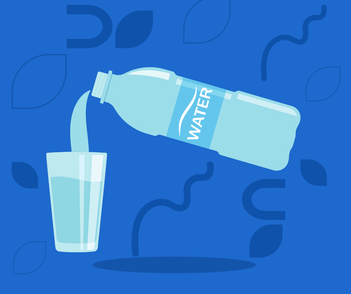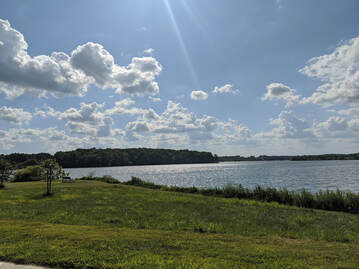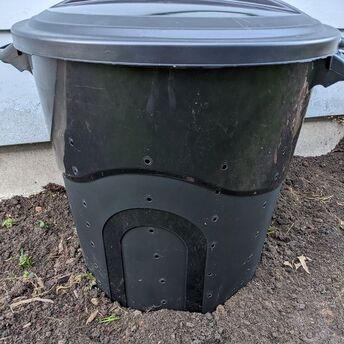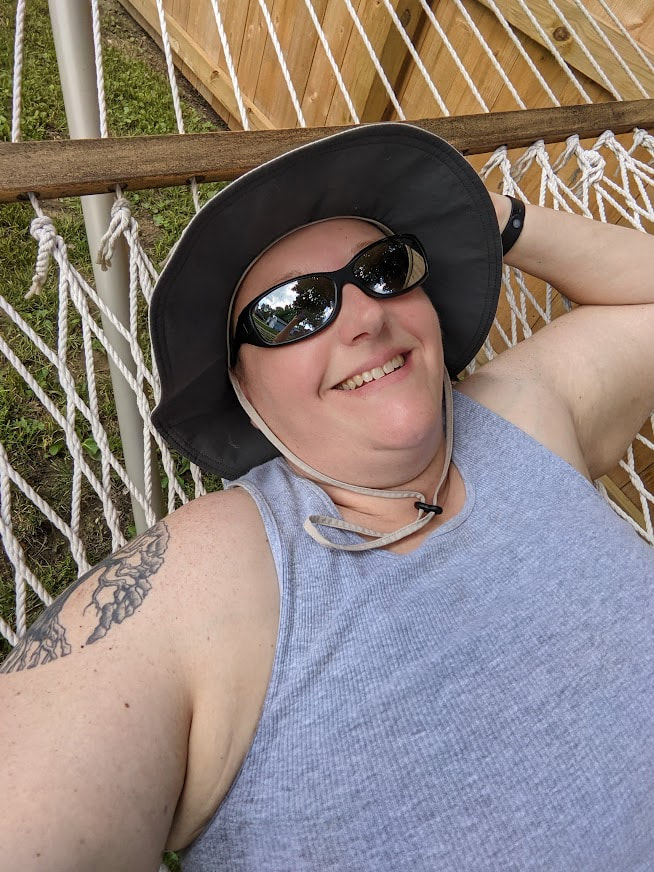 Last week I was mowing my yard after getting home from the church. I had decided to bag the clippings from my yard to use, partly, in our compost bin, and the rest I intended to take to the tree dump. This, of course, was a bit of extra work, and required some extra energy as well. I mowed in the backyard and side yards first. I then moved to the front yard. Stopping every time the bagger on my push mower felt full. I went from the mower to the compost bin and back. Then from the mower to the bed of my truck and back. Walking what seemed like twice as much as when I mow without the bagger. It was a warmer evening--sunny--but nothing the summer-loving human that I am couldn't handle. However, I must have appeared hot and red-faced enough for others to notice because just as I was finishing the front yard and preparing to move to the last side of the house--without warning--an icy bottle of water appeared in front of me. I was startled enough by this sudden appearance that I stopped the mower. I looked up from under the brim of my floppy yard work hat only to find that attached to the bottle of water was the hand of my neighbor--a young adult with whom I hadn't exchanged much conversation in the time that we have lived here. I asked her, "What's this?" She said, "Here's some cold water for you." I replied, "You didn't have to do that." She looked at me and said, "It's really hot out here." I said thank you, and that was it. My neighbor turned and headed back toward her house. I'm not sure how she felt after that brief, not-so-graceful-on-my-part exchange, but I was floored. I drank two-thirds of that bottle down immediately and finished the rest when I was done mowing. It was just what I needed when I needed it without me really knowing that I needed it. And it made all the difference (this is odd because I normally can't stomach super cold water) . It was just a bottle of water. It wasn't a million dollars. It wasn't an offer to finish mowing my yard for me. Yet, I couldn't get it out of my mind. It was totally unexpected. It was completely unsolicited. It was truly a random act of kindness that I didn't really know what to do with. It was the Samaritan woman at the well story from John--only BETTER--because unlike Jesus, I didn't ask for the water. My neighbor just noticed me. Just saw a need. Tended to that need. And went on about her day. She ministered to me. To ME! And these days later her kindness and her attentiveness linger. I wonder how many times we make ministry far more complicated than it needs to be? I wonder how often we get caught up in BIG plans and special events and fail to see the simple needs we can do something about right now? I wonder if, in focusing on the larger problems of our culture, and offering our commentary on those problems online or in casual conversation, we are missing our opportunities to minister to those in our immediate vicinity, and do the small thing we can do right here and now? Edward Everett Hale once said, "I am only one, but I am one. I cannot do everything, but I can do something. And I will not let what I cannot do interfere with what I can do." We're only one person in a world of people filled with need. It was only one bottle of cold water in a world that is horribly thirsty. But to this thirsty person, that one bottle of cold water meant the world. Learning to do what I can and not what I can't with you, Pr. Melissa  We just couldn't do anymore. After days of intermittent rain the evening was dry. It wasn't too hot, nor too cold. We had no plans. There was nothing keeping us from heading outdoors to work in the garden or continue with the patio project. We just...couldn't. This was life at our house Monday evening this week. Despite conditions being good. Despite our intentions. Despite the need to press on with projects and routine care of the garden, my spouse and I looked at each other that night and declared that we were not spending the evening outside. We could do no more--and I, for one, felt guilty about it. I imagine a lot of us do--feel guilty about resting. We think it's wasting time or wasting a "perfectly good evening" to rest. Some of us look at our days for evidence of why we need rest and, finding none, force ourselves to move because there is no logical reason that rest should be required. As if our bodies telling us to rest wasn't reason enough. We view rest as something that must be earned and something we must hustle toward. Some of us even hold the popular Western view, "I'll sleep when I'm dead." All of it a steaming pile of excuses to prolong work and wear fatigue as a status symbol. But who is that serving, really? When we force ourselves to keep hustling and to "earn rest"--who does that benefit? Certainly not you or me. Certainly not our families and the people who love us. As far as I can tell, the only beneficiaries of our work without limitations and our procrastination to rest are the systems in which we work and hustle. "There is no traffic jam on the extra mile," I've heard it said. There may not be a a traffic jam on the extra mile, but I have to wonder if that's because that same mile is littered with the wreckage of people who kept hustling down that path without taking the necessary breaks to recharge, refresh, and renew, and simply crashed and burned. The Church is often complicit in lifting up the holiness of the hustle. Once, when I was a layperson who was very active in the local church, I had a pastor tell me to take a break. "The Church will use you within an inch of your life," she said, "let's make sure it never gets that close." Yes, we are in this together. Yes, each person carries within them the spark of the Spirit that joins with other sparks to shine the light of Christ brightly, and we don't shine as bright without you. Yes, I say it all the time, your presence matters--for you and for others. And yes, we are doing important work--working toward liberation and fighting for justice for ALL of God's creation. But, as Tricia Hersey points out, "How can we access pleasure and joy and liberation if we're too tired to experience it?" The truth is, scripture is full of examples when Jesus rested from his important work of demonstrating the Way of love, justice, and peace. He took a rest when he was grieving: "When Jesus heard what had happened, he withdrew by boat privately to a solitary place.” (Matthew 14:13) He took a rest to gain perspective: “Very early in the morning, while it was still dark, Jesus got up, left the house and went off to a solitary place, where he prayed.” (Mark 1:35) He took a rest following intense periods of ministry work to care for himself and others: “Then, because so many people were coming and going that they did not even have a chance to eat, he said to them, ‘Come with me by yourselves to a quiet place and get some rest.'" (Mark 6:31) If Jesus, whom we follow, rested, certainly we can too. Certainly we can get up and go take a walk and look at the beauty of God's creation that we are a part of--even if we have work to do--if for no other reason but to remember that we are only a part of the world, not the whole world, and the world doesn't spin off its axis if we take a break. Certainly we can turn off the ringer on our phones and immerse ourselves in one of the books in that stack that's been collecting dust on our night stands. Certainly we can even, gasp! Clutch my pearls! Take a Sunday to do nothing but sleep and eat and spend time with the ones we love. That last one might sound strange coming from a pastor, but it's the truth. Sometimes we just need a break. A minute. A time to rest and recharge. Even I get 5 Sundays off every year. What's that quote from Ferris Bueller? “Life moves pretty fast. If you don't stop and look around once in a while, you could miss it.” I don't want us to miss it...any bit of it. Our lives of faith are meant to help us cultivate presence, not absence. Not hustle. Not more sucking it up and soldiering on. And call me crazy, but I'm not sure how we can be present most of the time, if we are hustling all of the time. We were created to love and to work and, beloved, we were created to rest. Without first having to earn it. Without first having to deserve it. Without conditions. Making it so is our spiritual practice. Learning the spiritual practice of rest with you, Pr. Melissa  The other day I made the first of what will (hopefully) become two compost bins at our house. You can check out the finished product in the picture on the left. Prior to this new "system," my spouse and I had simply used the "open air" approach in which we dug a shallow hole in the ground, put a crude wooden structure around the hole like a fence, and kept adding items to it. We would stir it from time to time, but the reality is that it took a lot of extra effort to get to the little bit of compost that was created at the bottom of the pile. We desperately need to improve the quality of the soil at our house--for the garden and the perennial beds, so my spouse and I began researching what would work better for our small space. And by "researching," I mean mostly watching YouTube. Which is where we found this idea: A garbage can with a locking lid with 7 or 8 two-inch holes drilled in the bottom, leveled and partially buried in the ground with about 100 holes drilled in the sides all the way around the body of the can. I added equal parts browns and greens (i.e. dried leaves and fresh grass clippings), added the contents from our indoor compost pail (which is a really cute Aldi find, by the way)--things like potato peels, coffee grounds, and eggshells, etc. I then mixed it up and wet it all down, making it--hopefully--a wonderfully attractive place for worms and bugs to turn it into compost. If I'm being honest, this whole process just amazes me. Think about it, we dump in all of these undesirable things--things that appear to be worthless and discard-worthy, the leftovers of our lives--and then we wait for Creation to turn it into something beautiful, desirable, and useful. We heap dead thing after dead thing into this container and wait for life to emerge. It's delightful, it's compost, and it's good news. And it's good news because of the hope that compost conveys. Journalist Jeff Chu explains, "A robust theology of the compost reminds us that we are still in the process of becoming, and God has written redemption into the story of creation itself. A robust theology of the compost reminds us that God has empowered us lowly worms to turn what is ugly and festering and dying into what is lovely and beautiful and life-giving. A robust theology of the compost testifies to the fact we can't do this alone, but we need others, because a single worm can't do very much but in community they have tremendous power. A robust theology of the compost testifies that we who have been told by society that we are worthless can act in the confidence of the knowledge that we are worthy. And a robust theology of the compost testifies that God urges those of us who have been shamed not to shame, but instead to love. Because in our acts of love we participate in preparing the soil in which God's reign of love and justice can take root." So, my fellow tenders of the land, take heart! Hope remains even though the soil of our lives may appear worthless, depleted, and dead. Hope remains even though it feels like we can't do much to turn things around because we don't labor alone. Hope remains as we work the land on which we find ourselves to prepare the soil for the kin-dom of God--the kin-dom of love and justice and LIFE--to take root. Out here, dear people--hope most certainly remains. Composting a rich, lovely, and life-giving faith with you, Pr. Melissa |
Rev. Melissa Sternhagen
Rev. Melissa Sternhagen was called as the pastor of St. Paul Congregational UCC in June of 2020. Prior to her call to St. Paul, Pr. Melissa worked as a hospice chaplain in the Ames, IA area, following pastorates at rural churches in Central Iowa and Southern Illinois. Pr. Melissa is a second-career pastor with a background in agribusiness and production & supply operations. She received her M.Div. from Eden Theological Seminary in St. Louis, MO, and holds a MA Ed. in Adult Education and Training, and a BA in Organizational Communications. Archives
July 2024
Categories |

 RSS Feed
RSS Feed
